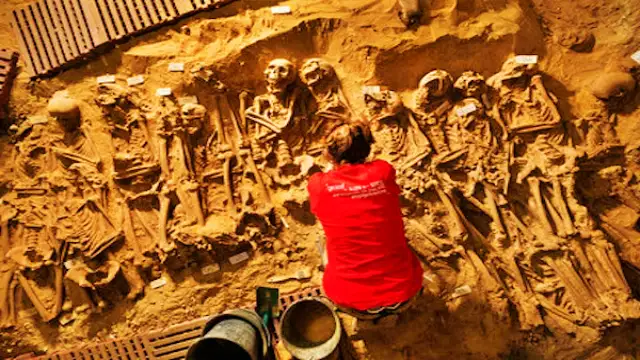A shocking discovery has been made beneath a Monoprix supermarket on Rue Sebastopol in Paris. Archaeologists uncovered dozens of skeletons buried deep in the ground, revealing a grim chapter of the city’s history. This site once housed a medieval hospital that was demolished in the 18th century.
The Discovery
When the supermarket management decided to renovate the basement, they unintentionally opened a door to the past. Archaeologists were called in to investigate what lay beneath the surface. What they found was unexpected: skeletons of men, women, and children buried in mass graves, some pits containing up to six layers of bodies.
Store manager Pascal Roy expressed his surprise, stating, “We expected to find a few bones, but not mass graves.” This discovery has raised many questions about the history of the site and the people who were buried there.
A Forgotten Cemetery
The area where the supermarket stands was once a cemetery for the hospital. When new buildings were constructed, many bodies were relocated. However, it seems that a significant number were left behind. Archaeologists have identified eight different burial pits so far. The first seven contained between five and twenty skeletons each. The eighth pit was particularly astonishing, revealing over 150 skeletons arranged in two rows.
As excavations continue, experts believe more remains may be uncovered. The sheer number of bodies suggests a major mortality crisis occurred in the past.
Understanding the Crisis
The exact cause of death for these individuals remains a mystery. However, the evidence indicates a sudden and significant loss of life. Isabelle Abadie, the lead archaeologist on the project, stated, “The fact that so many people were buried together shows that there was a major mortality crisis.”
This crisis could have been caused by various factors, such as an epidemic, famine, or extreme fever. Paris faced several outbreaks of plague during the 14th, 15th, and 16th centuries, along with a smallpox outbreak in the 17th century. These historical events could provide context for the mass graves found at the site.
Next Steps in Research
To learn more about the individuals buried in these graves, archaeologists will conduct carbon dating and DNA analysis. These tests will help identify the age of the remains and potentially reveal more about the lives of those who lived in Paris centuries ago.
Conclusion
The discovery beneath the Monoprix supermarket is a haunting reminder of the past. It highlights the importance of archaeological work in uncovering history that has been long forgotten. As researchers continue their work, we may gain valuable insights into the lives and deaths of those who once inhabited this vibrant city.
FAQs
1. What was discovered under the Monoprix supermarket?
Archaeologists found dozens of skeletons buried in mass graves beneath the supermarket.
2. Why were the bodies left behind?
Many bodies from the former hospital cemetery were not relocated during construction of new buildings.
3. How many skeletons have been found?
So far, over 150 skeletons have been discovered in various pits.
4. What caused the mass burial?
The cause of death is still unknown, but it may relate to an epidemic, famine, or other crises.
5. What will happen next with the remains?
Researchers will conduct carbon dating and DNA analysis to learn more about the individuals and their history.

